Disclaimer
This article is meant to shed light on an obscure, traditional food and to dissuade those that would try and eat snapping turtle eggs because they won't cook up like chicken eggs.
I also compare and contrast the laws around snapping turtle harvests, which have no limit in some areas near me, with the fact that harvesting snapping turtle eggs for food is illegal. I think asking questions is good. My words here aren't intended to suggest that anyone should break the law, which I unintendedly did, and am honest about.
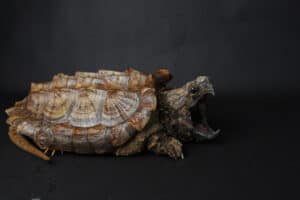
Original Post
It's the first week of June. The cattail shoots are perfect, and, hidden in the marshes nearby, another annual tradition, one that's been taking place for roughly 90 million years in more or less the same fashion, is playing out.
It's a yearly ritual that most people will never see firsthand, sans the occasional spectacle that is watching a lumbering, ancient creature cross the road. It's the season for egg laying, if you're a snapping turtle.
My introductory taste of turtle came while I was developing recipes for my first restaurant, and, I have to tell you, the first spoonful of snapping turtle soup I ate was magic.
The broth was richer than any fish soup, deep and meaty, almost beefy, with just enough hint of pond to make it interesting.
The meat itself I might compare to frog, if you crossed frogs with beef and the semi-aquatic character of Canadian geese.
Chef Lenny Russo had given me his turtle soup recipe to try out for the opening menu, and I thought a version of it would be a shoe-in for the retro steak house concept we were working on together.
It wasn't as easy a sell as I'd hoped, but just thinking of the aroma of turtle bubbling on the stove with aromatic vegetables and herbs kissed with sherry as I type is making my mouth water.
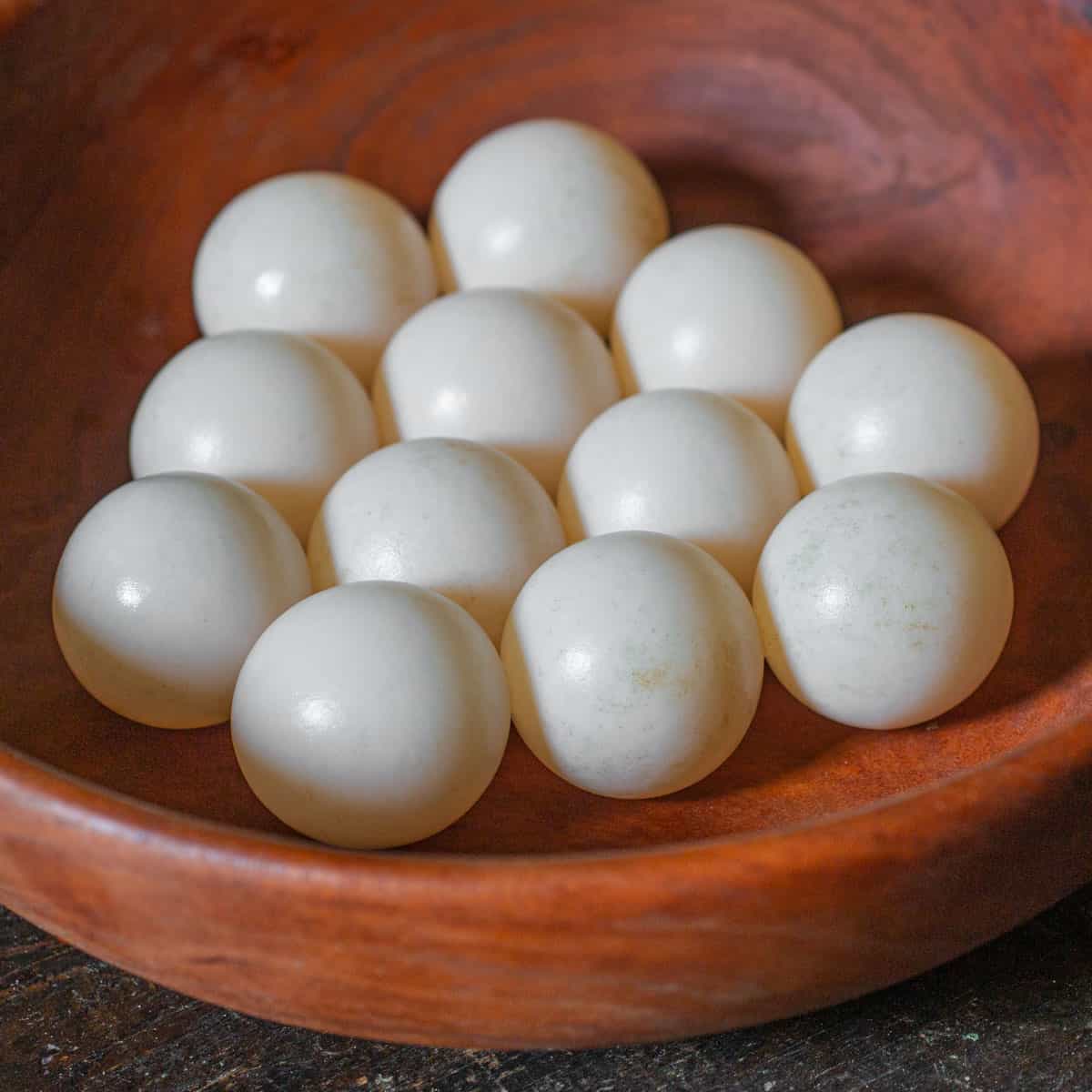
One thing you'll never see on a menu though, at least in the United States, are turtle eggs.
I mean I knew they were a thing, and after doing food research on Costa Rica before my vacation a few years ago I knew they were appreciated as a food (an understatement), but finding a nest of them seemed impossible. Heck, even if I did somehow find a nest, getting wild eggs at a stage of edibility similar to what we see in a super market is not easy.
After trudging through the cattail marshes hunting goose eggs a few years ago I felt like I'd have a better chance of getting struck by lightning than finding any oeuf au tortue at the perfect time.
As luck would have it, there's a cattail marsh in front of the farm in Wisconsin, and, one day during the first week of June, a few members of my Girlfriend’s family who appreciate my funky foods mentioned they'd just seen a big mama snapper laying eggs on the driveway.
So, I grabbed a shovel and went out to find me a cache of dinosaur eggs.
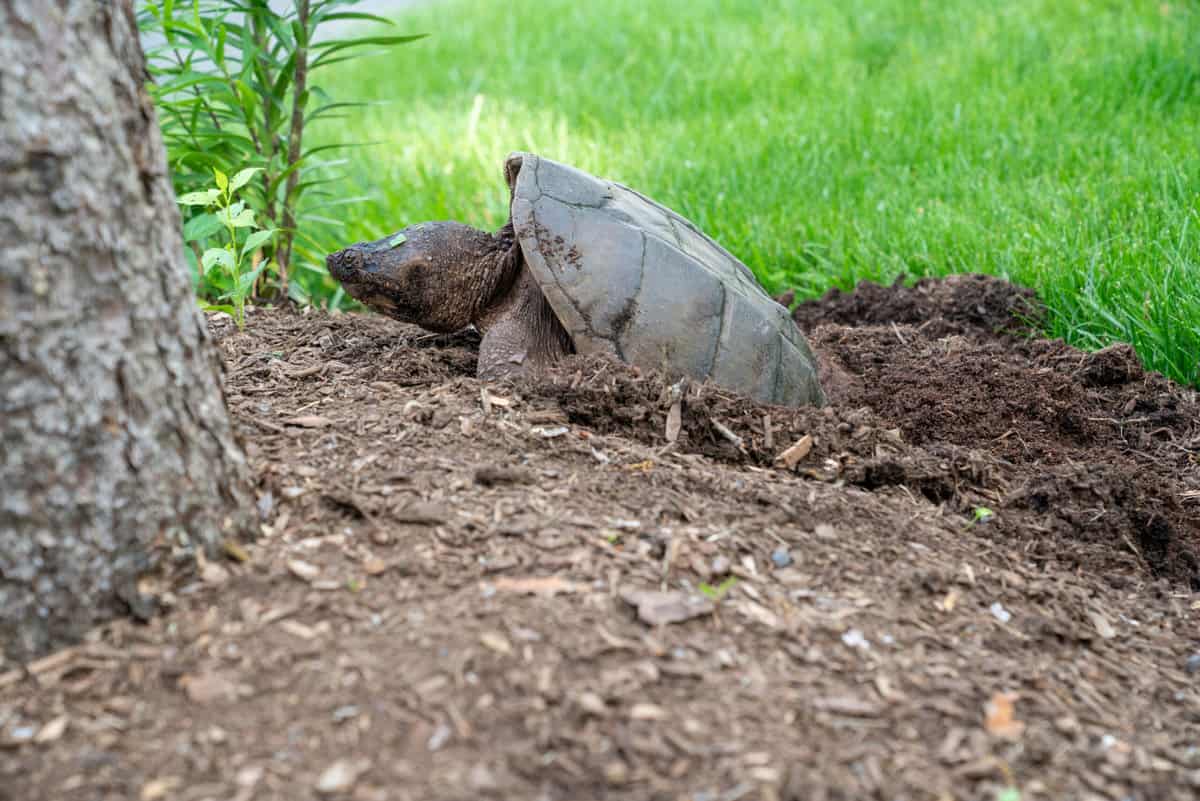
Legality
In my excitement I neglected to think about the particulars of the area, so I also need to mention that it is illegal to harvest snapping turtle eggs in Wisconsin as the season starts in July. Part of my goal here (especially with my account of eating) is to dissuade curious tasters and steer them to enjoying turtle meat instead, which has an open season in areas near me.
It is legal to possess and sell turtle eggs in MN with a hatchery license, although the conservation officers I spoke to said that possession is not intended for culinary purposes.
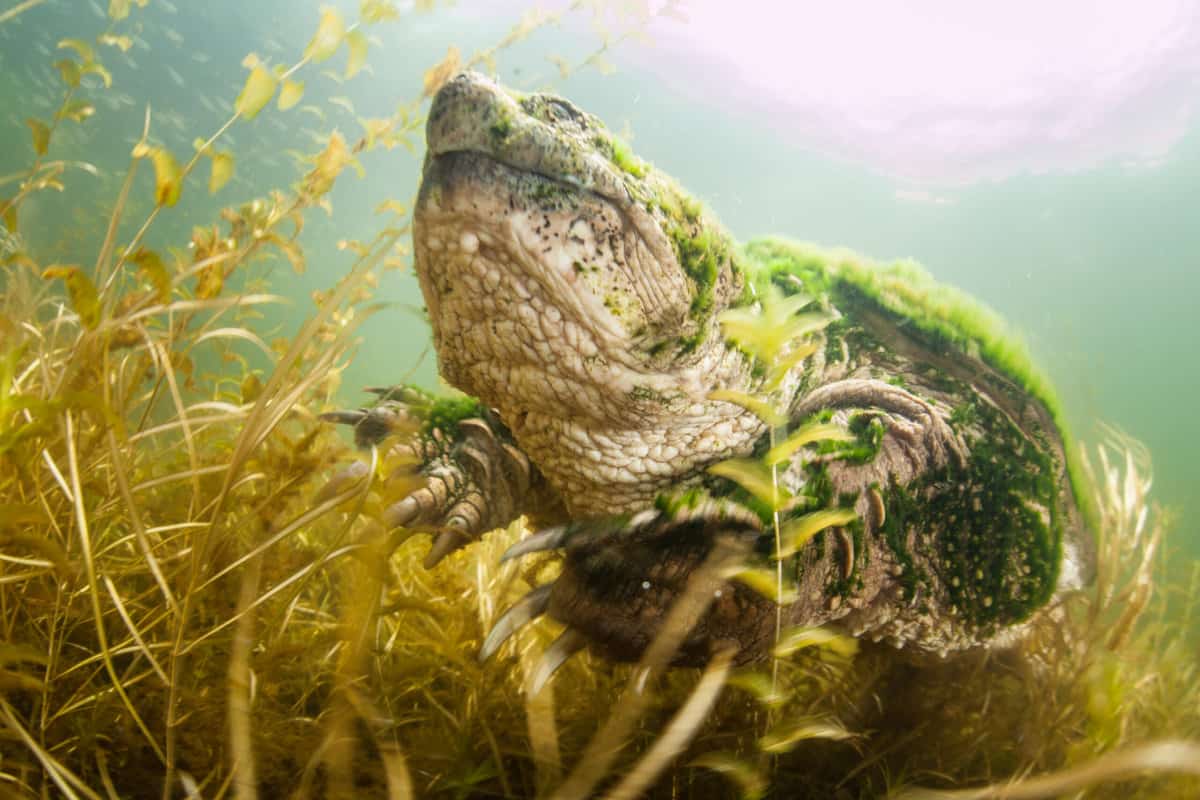
As my audience is global here, and regulations vary around the country, I'll also mention that in different parts of the world it is absolutely legal to harvest some species of turtle eggs as they're a traditional food.
It's also possible in some places to get a surprise harvest of unlaid turtle eggs depending on when they're harvested. Our relationship with turtles as food is likely one of the oldest ones there is, and it's worth remembering.
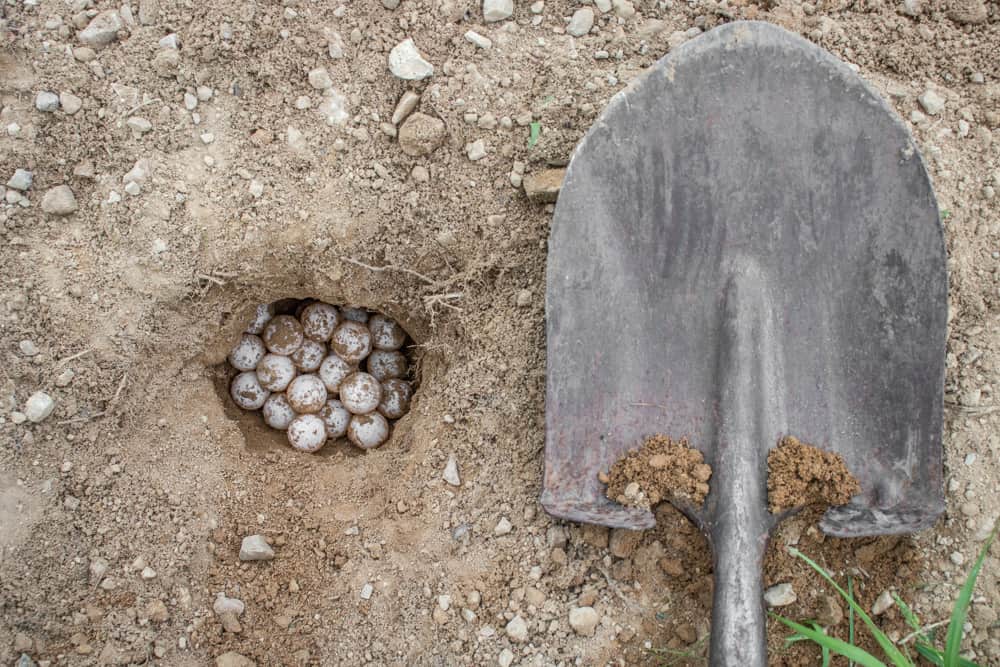
Scanning the gravel road, I saw a patch of dirt that looked a bit darker than the surrounding area.
I knelt down to inspect it, looking over my shoulder for the big mama snapper part of me believed was lying in wait, ready to rush from the cattails to bite off the first finger I poked inside the nest. I expected the gravel to be soft, being recently dug, but it was rock hard and firm, more along the lines of hardened clay than a sandbox.
I chipped away carefully at the darker gravel with the shovel, then slowly removed the dirt with my hands, excavating a good portion of the driveway.
After the fact, I learned why the soil on top of the nest is hard: mama turtle pees on the ground to get it loose, then packs it down after laying the eggs. For the record, turtle pee is odorless, as far as I can tell.
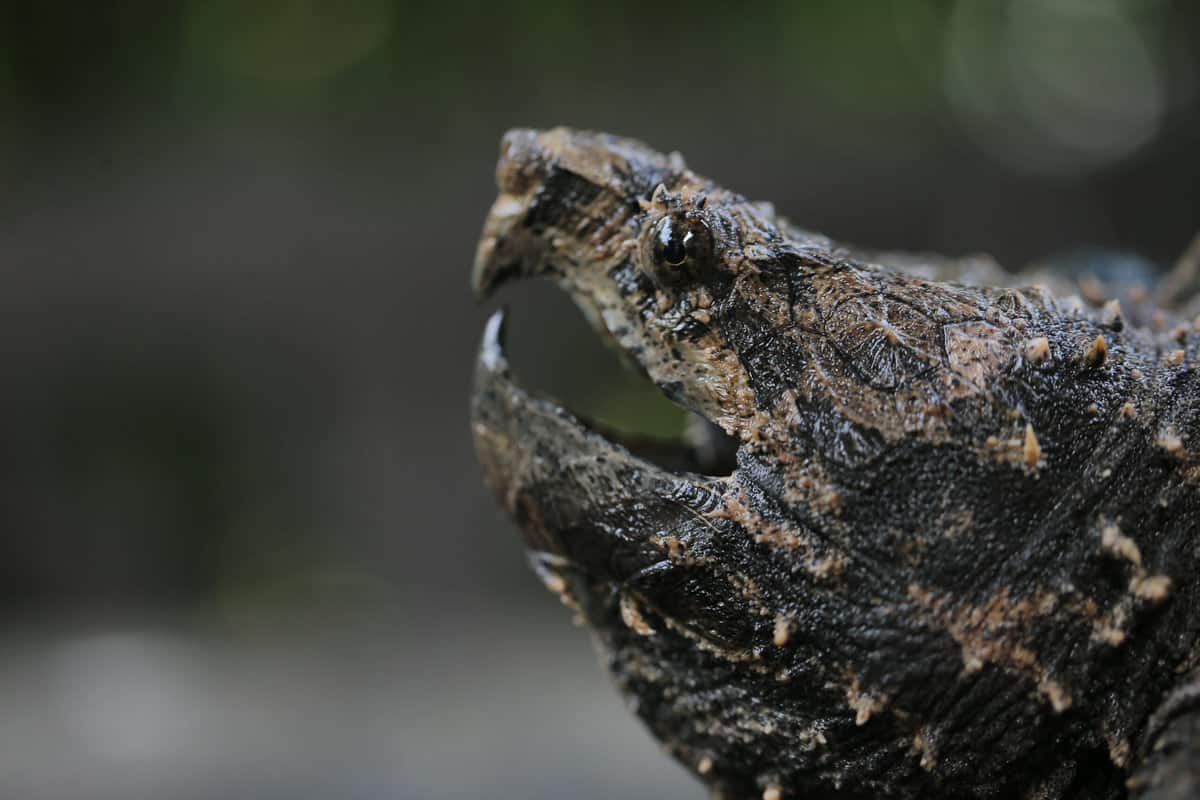
A couple inches below the soil, I found the nest: a little hollowed out cavern filled to bursting with more eggs than I'd ever seen.
I counted over 50 eggs, which is apparently a good showing as I've read they can lay as few as 20 eggs.
The snapping turtle population is regarded as stable from what I know (at least from a global perspective). I also knew (from armchair research) that the majority of nests are raided by predators, so I only took a handful to try.
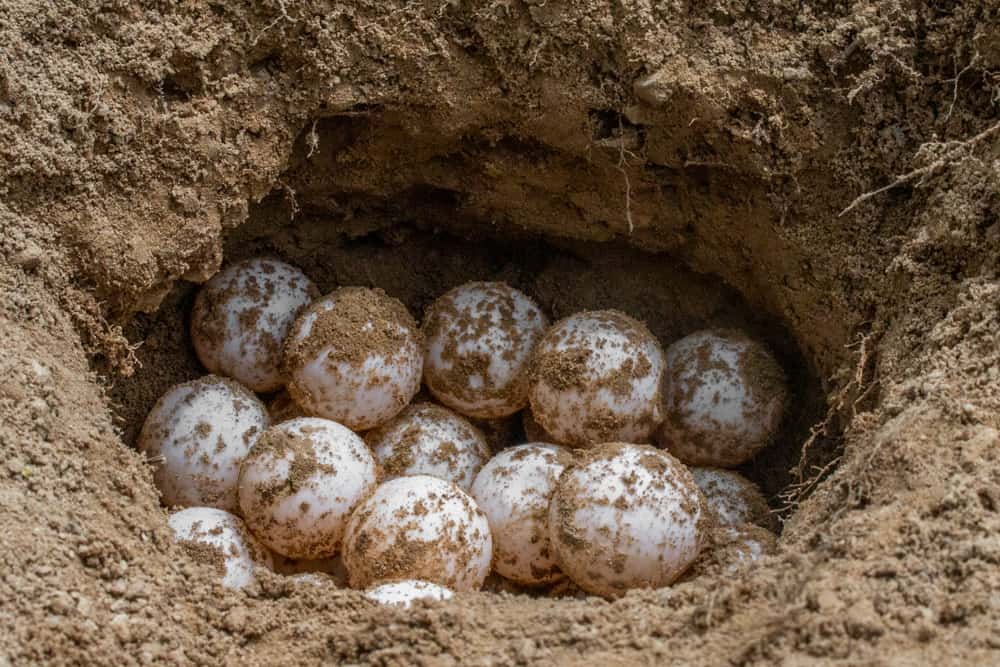
I packed the dirt back in as best I could to keep the eggs safe, said a quick prayer to Master Splinter to keep the foxes, owls and possums away, and brought the eggs back to the kitchen.
The first thing I noticed was that the eggs were soft. The skin of turtle eggs isn't hard, it's leathery and malleable, like a soft ping-pong ball.
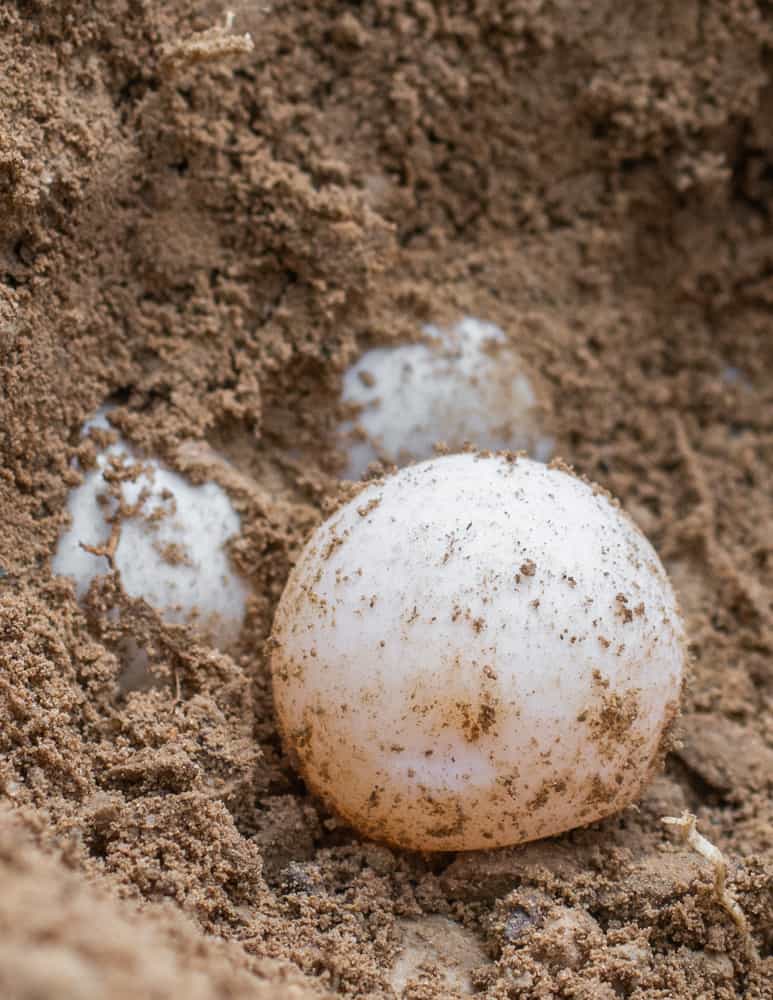
I washed and refrigerated the eggs to keep them fresh and retard any growth, then got to work researching how best to sample my Mesozoic dinosaur ovum.
Marvel of the modern age that it is, you bet there's a YouTube video showing how to cook unlaid snapping turtle eggs.
The guy in the video I watched scrambled them and, looking at the modest harvest of small eggs I had, I thought it would be a waste, so I went with the Classic Costa Rican treatment: boiled and eaten out of hand as a bar snack with the requisite pinch of salt, hot sauce and lime.
Quick tangent. Costa Ricans love their turtle eggs so much that poaching is apparently a big problem, so much so that fake eggs fitted with GPS trackers have been placed in nests to track the poachers.
There's a link to the whole story (what introduced me to the thought of eating turtle eggs in the first place) at the bottom of the post. Kinda gives a new meaning to poached eggs, Eh? 🙂
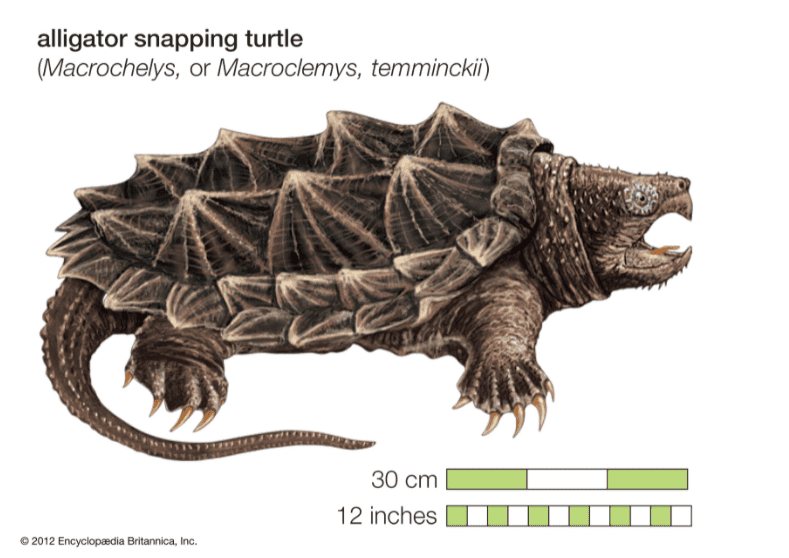
Cooking and Eating
The big question. What's it like to eat a turtle egg? Call it a delicacy. I've read that flavors can vary between species, and I'd assume diet plays a part in the taste as they're omnivorous and will search out live protein, mostly in the form of birds.
I found the reference to colonial Americans starting turtle hunting clubs (a turtle hunt is called a "frolic") after seeing their chickens dragged off into the deep-link at the bottom of the post to that.
On a related note, my friend Jamie Carlson kept a few snappers in tubs full of water to purge them and said everything from fur, twigs, and rocks came out of their system in the process (link at the bottom of the page).
My eggs though, were mild, and pleasant tasting, but there's one big thing involved with turtle (and I can only assume other reptilian eggs as well) that I didn't expect, and something that will turn most people off from eating them.
Jiggy whites
I boiled my turtle eggs, peeled back the still pliable shell, and did a double take, thinking for a moment I'd under cooked them as the whites didn't set. Yes, the whites, even cooked for a good 20 minutes as I did mine, were still, erm, jiggly.
It's not liquid per-se, but It's definitely more liquid than it is cooked white.
Having people peel back the soft turtle shell, drop in a pinch of salt, a dash of hot sauce and a squirt of lime before sucking down the contents (proceeded by a shot of local Sangrita or Cacique) could be the christening to a proper Costa Rican-themed summer party though.
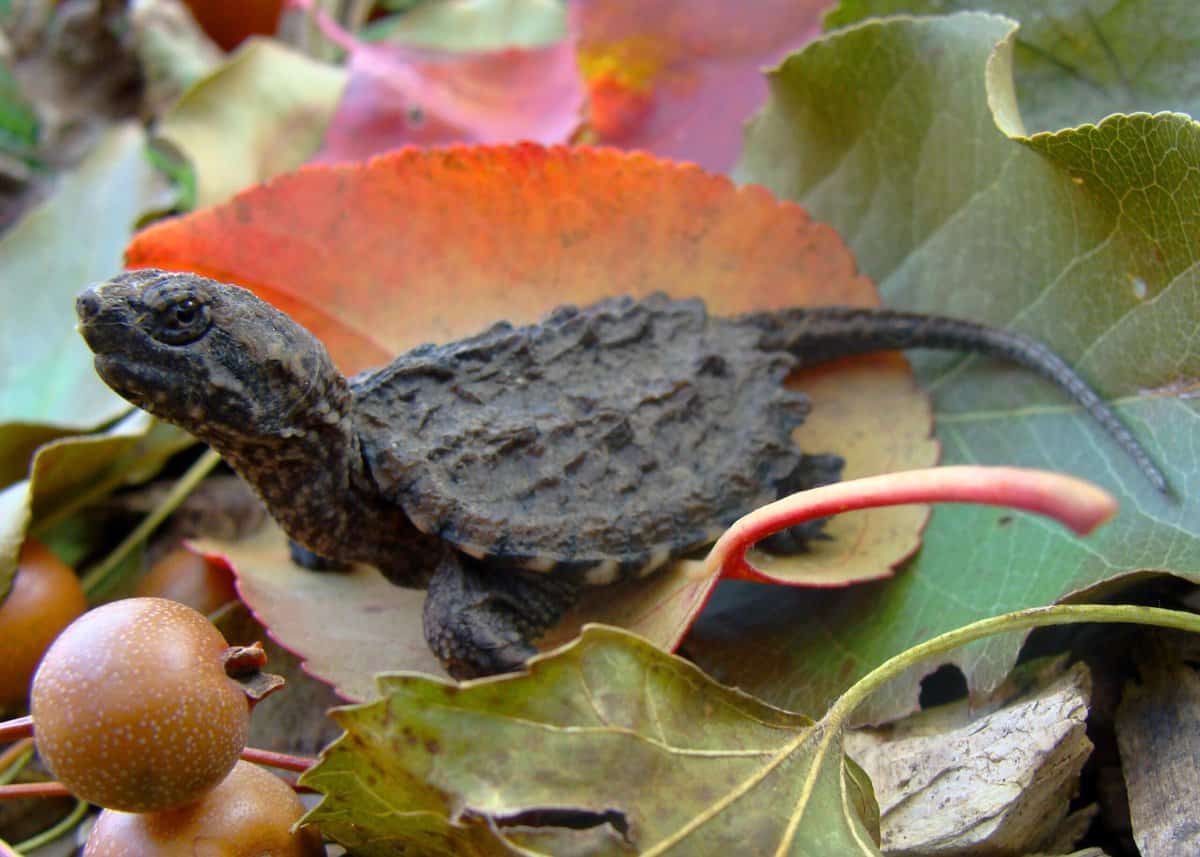
In hindsight, I liked the novelty of eating snapping turtle eggs, and the mild, texturally confronting eating was fun (when did hot sauce, lime and salt taste bad?).
But, I have to say, a week or so after I ate the turtle eggs, I started seeing the most wee snapping turtles embarking on the epic journey to cross the road near where the nest was.
Knowing their chances of success are slim, I'll probably pass if I see another nest. That being said, I'm still craving turtle soup, so, after she's done laying eggs, Mama's fair game.
Turtle Conservation
I know this post will ruffle some feathers, I expect that. But, before you send over a turf-burning email, consider a few things.
Habitat loss is a thing. It's easy, and reflexive to say a chef who ate a handful of turtle eggs has committed some kind of sin, but are curious nature lovers truly the biggest threat to turtles around the world?
Just about every day wetlands and turtle habitat are filled in for civil development and companies with money can buy and sell wetland credits to get approved on the construction, shuffling around land as their money allows, displacing multitudes of animals of which turtles are only one.
It's as if the turtles are expected to receive and understand an eviction notice so they can plan a move to newly created habitat. I use a few eggs as props here to spur a discussion, not to show off some blithe trophy.
Further Reading
Catching Turtle Poachers with Decoy Eggs in Costa Rica
Toasting with Turtle Eggs (legal egg harvests / 2020)
Snapping turtles as pets, etc (don't try this at home)
Hoboken Turtle Club (patronized by Benjamin Franklin, Thomas Jefferson, and George Washington)
Jamie Carlson and The Silence of the Turtles (Growler Magazine)
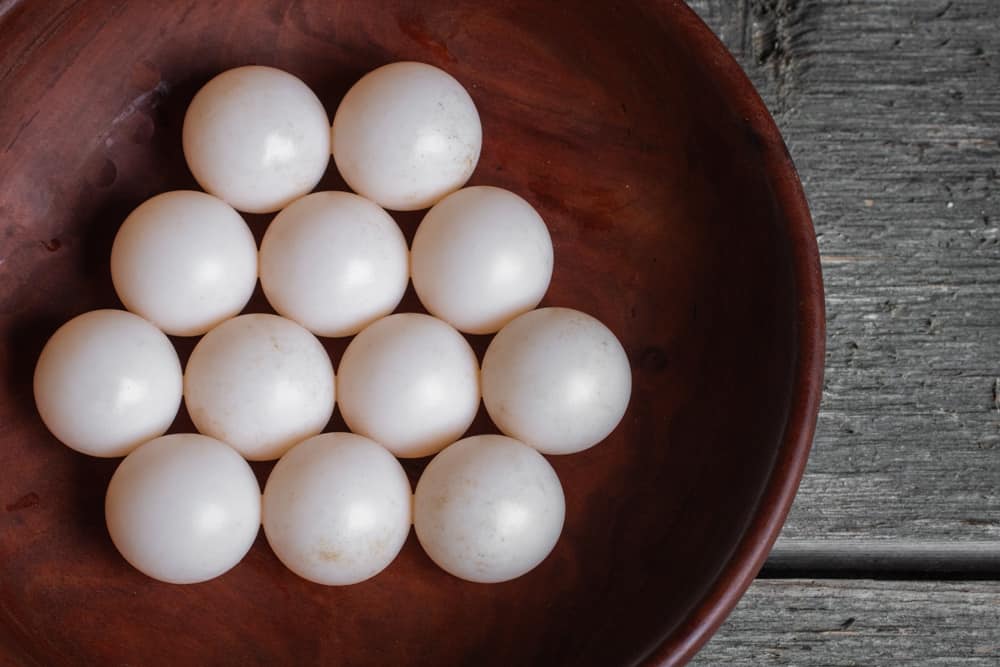

Klim
How tough is it to actually crack or peel a snapper turtle egg? I'm wondering how much pressure and weight they can withstand before popping being as they're buried under all that dirt.
Alan Bergo
They're rubbery. It's not difficult.
Andrew Roberts
A great read indeed Alan, thank you. Your flair for information giving and story telling is on par to the other outdoorsmen content that I read.
I was born and raised in Savannah, Georgia 36yrs ago. My father moved from the historic downtown area to Isle of Hope, an island located next to Historic Wormsloe Plantation, (great history, you should visit).
One of the first things I ever learned about Isle of Hope was that there used to be, (early 1900's) a turtle soup canning company located at where the local marina is now. A. M. Barbee and Son's Terrapin Farm, which specialized in fresh terrapin meat and canned turtle soup. It was a very popular dish, and with limited terrapin populations in the North, Barbee made a successful business shipping his meat and canned soups to the fancy hotels and restaurants in the big cities. Sadly, hunted to near extinction, and now on the threatened species list, this traditional Southern cuisine 'died' out. My fathers family is from Florida, Lake City area, and yes, we much enjoy our "cooter stew" as it was mentioned above. I liken the snapper meat more to a muddy beaver: thick beefyness with a hint of pond/swamp/mud, but not to overpowering.
Turtle really is a delicacy for us Southerners, a tradition some would say. I hope that you get a chance to harvest a healthy turtle and enjoy it as we have for centuries.
Your article brought back a lot of childhood memories.
Thank you for that Alan. 🙂
I posted 2 links below for additional reading.
Thanks again!
AJ Roberts
Savannah, GA
https://isleofhopenews.com/hopes-history-toby-the-terrapin-pianist/
https://gardenandgun.com/slideshow/greetings-from-yesteryear/list/
Alan Bergo
Thanks AJ, this is great.
Katie
Thanks for the great post, Alan! I live in Wisconsin and have always thought turtle soup would be cool to try. It looks like we have a long season for turtles here, so I have a lot of research to do on the entire turtle harvesting process. I feel like it’s a whole new world to explore!
Alan Bergo
Thanks Katie.
Marie
I want an apology for the offensive YT post your link sent me to. Cooter's shirt-free overalls are something I will never be able to un-see. XD
Alan Bergo
My stomach hurt from laughing. That guy was a hoot, right? I tried to find a place to mention the colloquial name of turtle in the South (cooter) but I couldn't find one.
Erik Jones
Interesting article. I did not realize how delicious turtles were. Have you tried other species, or just snapping turtles?
I must say, from an ecological viewpoint, I hope that turtle eating doesn't catch on widely, no matter how tasty they are. Given their slow rate of growth, hunting turtles is a rather different business from hunting deer, ducks, etc. Populations are not able to recover from the harvest of mature adults nearly as fast.
If you continue to eat snapping turtles, perhaps consider hunting males and leaving Mama Snapper alone. The removal of mature females is especially bad for reproduction.
Alan Bergo
Thanks for commenting Erik. I have only eaten snappers as they're the only ones that are available in commercial quantity. A fair wholesale price would be around 20-35$/lb-more expensive than any other protein I know sans true Wagyu beef and a few other novelties. And yes, turtles are slow to mature and long-lived, which further complicates things as their long life means they'll concentrate heavy metals and toxins in their flesh, making consumption, or over-consumption rather, undesirable. As far as sustainability of them, I will take them if I feel inclined in season, male or female, but, just like with anything else, the location of harvesting and local population is important to take into account. In MN, the limit of snappers is, unlimited. On the Mississippi it's 10. Either limit is high by any consideration. That's just for MN though, although as one commenter mentioned MA has a completely open season on them. I spoke with two hunters who've cleaned snappers while I was writing this, along with the conservation officers, and I would say with some confidence that cleaning two snappers is much more work than most people are willing to put into their food.
Margaret
I had a German mum❣️ She made us turtle soup once❣️It was good but I have a question ❣️ I can’t remember if she said that there’re 5 or 7 kinds of meat in the turtle❣️Being in the state of Maine USA 🇺🇸 I’ve eaten most of the kinds of fauna here but not turtle eggs❣️Thank You for your interesting words, it brought back good memories❣️Looking forward to your answer❣️🍀💜🙏💋
Alan Bergo
Margaret, I haven't butchered one but I know people say there are many different types of meat in them. When I bought it commercially it was usually in chunks or on the bone and most of it appeared to be dark red meat.
Joe
I know you write with the season's but your posts are always right on time to my curiosities. This weekend we were camped on a Minnesota lakeshore and had the joy of watching three painted turtles laying eggs a canoe paddle's length from my tent around dinner time. I was looking back and forth between them and the turtle harvesting page in my fishing regs book but had too many questions and was full up on trout anyways. I've come to understand that the eggs are a no go for the standard Minnesota angler license holder but as to the turtle - would a painted or softshell be worthy of these snapper recipes or are they too small to be worth the trouble? Thanks for the story!
Alan Bergo
Thanks Joe. The other turtles are so small compared to snappers, and cleaning them is a labor-intensive process so I'd probably skip them, especially if you're good at catching trout! The limit on the Mississippi is 10 snappers, but we all know that it's not the most pristine river. Since the turtles concentrate heavy metals etc I'd be pretty picky about the water source they've been living in if I took some.
Xan
A great section from John McPhee’s story “Travels in Georgia”:
“The yolk of a turtle egg cooks readily to a soft, mushy yellow. The albumen, though, pops and bubbles and jumps around the pan, and will not congeal. No matter how blazing the heat beneath it may be, the white of the egg of the snapping turtle will not turn milky and set. It will jump like a frog and bounce and dance and skitter all over the pan until your patience snaps or the fire dies. So you give up trying to cook it. You swallow it hot and raw.”
Alan Bergo
Thanks Xan, gotta tell ya, I was just grinning ear to ear reading that. Hot and raw!
Laura Chávez Silverman
So interesting and such wonderful perspective on the greater picture. I remember eating turtle soup in Japan (not knowing what it was) and finding the flavor so rich and savory. Thanks, as always, for sharing your adventures.
Alan Bergo
Thanks Laura.
Bob Ralke
What a great read, thank you for educating me.
Alan Bergo
Thanks Bob
Mark Szarek
Hello,
Here in Massachusetts the snapping turtle has an open season and the only predator to them is man, no other animal will mess with them. With most people avoiding them the only time they are in an form of danger is when they try to cross a road, drivers do not look down and the turtles get hit. Is aw one yesterday June 5th in our neighborhood looking for a nesting site. Raccoons are the number one thief’s out there. So I may try turtle meat once the season opens. Many thanks for the info. Any idea as to a good recipe?
Mark
Alan Bergo
Mark, thanks for commenting, that's helpful to know. I haven't gotten nearly as many nasty grams as I expected but I've been looking for places that have open season on snappers so that is super helpful! Thank you. I'll send you the recipe, you may have to divide the proportions to make a home batch, but it's just simple division.
Linda Reinhart
Sorry - I re-checked my old recipe book and discovered the authors were actually 3 brothers of Acadian descent, Don, Ashby, and Willie Landry. My apologies to the Landry family.
David Griggs
Good Morning Alan,
I look forward to your posts every week, to enjoy with morning coffee. They keep me going. I have my two teenage boys and both my senile parents living in my home, and am the sole care giver. As such, my time is spent providing care to them, as apposed to foraging.
My passions are wild harvesting flora and fauna, and to to see the magic you work with ingredients brings many smiles to my face. I am blessed to live on 30 acres with a quarter of a mile frontage on a meandering river. While there are snapping turtles that reside in the river, they are becoming very uncommon. In the 21 years I have lived here, I have only encountered them less than half of a dozen times.
I have always wanted to try turtle, but every time I am confronted with the opportunity to harvest one, I am overtaken with guilt. Now, I am not shy about death, and have been directly responsible for the taking of 1000's of animals lives, both domestic and wild, for the purposes of food, pest control, and predator control......but this guilt......it overcomes me. I look at this amazing creature, that has survived to adulthood, and wonder,"how old it this thing?"
Turtles, live to be ancient. And for some reason, this stops me cold. Would I eat one if prepared by someone else, yes, with great relish. I am familiar with how to process a turtle, and if I had to, I could, but taking the life of a turtle, is very difficult for me......
That, and the biology of the potential accumulation of heavy metals and pesticides, give me pause. Given that snapping turtles are apex predators, I can't help but wonder what sort of chemical nasties could be found if they were looked for.....stuff with unbelievably long half-lives.....that would no doubt affect the long term health of the consumer....ie:probably not a good idea to feed turtle products to kids or women planning on becoming pregnant.
As a matter of interest, in,"The Adventures of Tom Sawyer", chapter 16, Tom and Huckleberry Finn enjoy two meals of fried turtle eggs while camping on an island located in the Mississippi River.
Funny, but I wonder if painted turtle eggs would exhibit the same characteristics as snapping turtle eggs? They are much more common, and can be about the same volume, but are of a more oblong nature.
In closing, I leave you with the idea of turtle ballet.
Thanks for the wonderful posts, already looking forward to next week's post,
Dave
Linda Reinhart
Back in the 1960s, when we lived in Northern MN our kids encountered a huge snapper crossing the road. They borrowed a washtub from the nearby neighbor and managed to squeeze it over the turtle - it was that big!. Two of them sat on the washtub while the third ran home to fetch their father. It didn't have eggs, so it was either a male or had already laid.
My husband cut off its head and hung it on the clothesline by its tail overnight. When he tried to cut the shells apart it still moved its foot in a seeming attempt to push the knife away. It was very difficult to dress out. The children played with the head for 3 days because its snapping reflex didn't die readily.
I used a tomato soup recipe from the 1956 book from the south Louisiana restaurant of Don Ashby and Willie Landry, Don's Seafood and Steak House. We did, indeed, conclude that it was about the best of the wild meats. The meat had the disconcerting tendency to quiver in your hand when you salted it and to move in the pan if you fried it - like frog legs do.
It is a fond memory. Thank you for reviving it.
Lenny Russo
As a native of Hoboken, NJ and as snapping turtle afficianado, I am somewhat embarrassed to say that I have never heard of the Hoboken Turtle Club. I have been to the grounds of the former Stevens Estate, now the Stevens Institute of Technology, on the banks of the Hudson River. Aside from Frank Sinatra, John Stevens, he who built the first steam locomotive and first steamship and was the progenitor of the US patent system, is the most famous former denizen of my home town. Tales of his military, legal and engineering genius are well worn in the annals of Hoboken history, but his predeliction for snapping turtles has somehow faded from the accounts.
Alan Bergo
Totally forgot you were from Hoboken. I got a pretty good kick from reading the story of chickens getting eaten by turtles so much they had to form a hunting club to curb it.
Lenny Russo
You and I will hencefort be forever connected through the Hoboken Turtle Club.
Lenny Russo
Also, I misspelled both "henceforth" and "afficionado" so we will also be connected through hasty typing.
Ben Rosen
Internet story . I was always curious to try Turtle . After watching on Anthony Bourdain show . Costa Rica is awesome.
Alan Bergo
Yeah turtle meat is really good stuff. Super expensive.